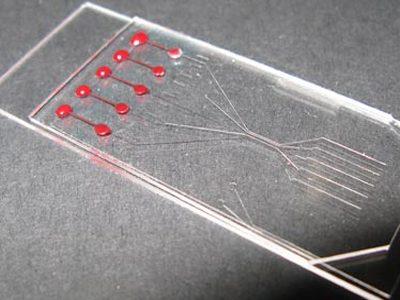The development of 'smart toilets' that thoroughly manage the health of people who use the latest technology is in progress.

With the advent of smartwatches, modern people can now manage various health-related barometers in real time, such as their sleep time, heart rate, maximal oxygen uptake (VO 2 max), and running records. .. And the Wall Street Journal, an American economic newspaper, reports that research and development of 'smart toilets' is underway as the next gadget to track one's health.
Smartwatches Track Our Health. Smart Toilets Aren't Too Far Behind. --WSJ
Smart toilets being developed by researchers and companies not only have smart speakers embedded or built-in heating in the toilet seat, but also look for signs of gastrointestinal illness, measure blood pressure, and 'more. It is designed to advise you, 'You should eat fish.'
It has been practiced for a long time to collect feces and urine to investigate the health condition, but in recent years, it has been gradually elucidated how intestinal bacteria affect human health condition. As a result, there is new interest. For example, in a pandemic of the new coronavirus, many municipalities have begun monitoring sewage, and health officials are looking for early signs of the virus in cities and neighborhoods and tracking its spread.
Similarly, from the idea of utilizing the technology of 'obtaining health information from feces and urine' at the individual level, smart toilets that remotely check the inside of the toilet bowl are being researched. Some of these smart toilets are for medical use, with the goal of doctors monitoring patients at high risk for chronic or specific illnesses, while they are priced at tens of thousands to hundreds of thousands of yen. Some companies are planning to sell it to the general public as a tool to understand and improve their health condition.
Health equipment manufacturer Medic.life is developing a smart toilet 'Medic.Lav' that measures the user's weight, urinary sugar content, and sodium concentration. Medic.Lav claims that it can also detect viruses in urine with a high-performance sensor, and is aiming for approval from the US Food and Drug Administration (FDA).

A research team at Stanford University School of Medicine is developing a smart toilet that attaches a camera to the toilet bowl, trains machine learning algorithms, and analyzes excrement against diagnostic charts. This smart toilet can track the flow, color, and amount of urine, and is also equipped with a testing device to detect specific molecules contained in urine. In addition, in order to identify the user, fingerprints are read with a button that flushes water, and a system called 'anal print' that scans the characteristics of the anus is also installed.
The research team at Stanford University has signed a toilet manufacturing contract with Korean toilet maker Izen. Seungmin Park, who leads the project, said he hopes to complete a prototype that will be in clinical trials by the end of 2021.

Sonia Grego, who heads the development of smart toilets at Duke University, said, 'Smart toilets allow doctors to monitor patients with chronic illnesses such as irritable bowel syndrome from a distance and discover early symptoms of the illness. Another advantage is that you can make frequent long-term traceable measurements, which is more specific than going to the hospital and making sporadic measurements. It could be a more effective and non-invasive way to quickly identify and flag changes while tracking indicators of. '

However, with the current smart toilet technology, some vital signs and urine tests can be obtained with a level of accuracy that can be applied to medical treatment, but smart that enables highly accurate analysis of excrement components. The realization of toilets is still a long way off. It seems that it will take time to develop a method to replenish the chemical substances required for component analysis and to reduce the manufacturing cost of smart toilets.
In addition, a Stanford University research team surveyed 300 people found that one-third of respondents felt uncomfortable with the concept of 'smart toilets that collect health data,' many of which maximize privacy. Listed as a concern. In addition, more than half of the respondents answered that they 'feel some resistance' to the smart toilet itself.
Chad Adams, CEO of Medic.life, said, 'In order for people to use something, it needs to be surprisingly simple. In that respect, smart toilets are simple. Everyone must go to the toilet. Because it doesn't become. '
Related Posts:
in Hardware, Posted by log1i_yk







